The COVID-19 contain framework is the blueprint for how NHS Test and Trace is working in partnership with local authorities, Public Health England, the NHS, other local business and community partners and the wider public to take action against outbreaks.
New regulations will come into effect tomorrow (18 July) to give local and national government additional powers to stop local transmission of the virus. These will allow them to restrict local public gatherings and events, and close local businesses premises and outdoor spaces.
Further data is also being provided. The number of positive cases at both an upper and lower-tier local authority level are already published daily on GOV.UK. From yesterday, this data was broken down even further to local areas of 5,000 to 15,000 people, which will be published weekly.
The government will also be publishing a weekly watchlist summary of specific areas of concern, areas receiving enhanced support from NHS Test and Trace, and areas where national interventions are being taken, as determined by DHSC Ministers and the CMO at the Local Action Committee.
These areas will be determined by Department for Health and Social Care ministers and the Chief Medical Officer at the Local Action Committee.
This will form part of the weekly PHE COVID-19 surveillance report.
Health Secretary Matt Hancock said:
We’re setting out a new framework and local powers to further help local leaders across England protect their communities from coronavirus. They have the full support of NHS Test and Trace alongside these new powers and will receive help with specific interventions, including additional testing as needed, to prevent the transmission of the virus in their community.
We continue to rely on the public’s support to protect against new cases, getting a test if they experience symptoms, and following the advice they receive from NHS Test and Trace.
We all need our friends, colleagues, neighbours and family to continue to play their part.
The contain framework includes an outline of the options available to local authorities to respond to cases of the virus, including accelerated testing of asymptomatic people and increased public health messaging.
Local authorities and local partners have already done extensive work to protect the public from coronavirus, including developing and publishing local outbreak control plans tailored to their areas, supported by £300 million of funding announced last month to support work by local communities to protect their area from the virus.
National Test and Trace Adviser and Chief Executive of Leeds City Council, Tom Riordan, said:
Across the country, local authorities have worked exceptionally hard to prepare their communities for coronavirus outbreaks, protecting the most vulnerable and saving lives and I want to say thank you to all of those public health teams.
The new COVID-19 contain framework and additional powers for local government will give local leaders further tools from NHS Test and Trace to protect against the spread of the virus, scaling interventions to respond to cases in their communities. These tools will be essential as we ease national social-distancing measures, to make sure that community transmission continues to be dealt with quickly and effectively.
Tackling this virus is something we need to do together, and we can all play our part. Washing our hands regularly, practising social distancing, wearing face coverings and getting a test quickly if you develop one of the symptoms – a new continuous cough, high temperature or loss or change to your sense of smell or taste – will make a difference, not just to you but to your friends and family and your community.
Local authorities experiencing spikes in coronavirus cases will continue to work with NHS Test and Trace, developing incident management plans and leading on local interventions to stop transmission where required. The interventions they take will be closely monitored and issues escalated for further action to a national level if they have not led to a significant reduction in cases.
The framework also outlines how local leaders of businesses, schools and religious groups can get support from health protection teams when they register a number of cases in their organisation.
More detailed postcode-level local data to support local activity was made available to all Directors of Public Health in England on 24 June to support their work to stop the spread of the virus, and this continues to be further developed. This will now be updated daily and access to NHS Test and Trace contract-tracing data will also now be provided.

